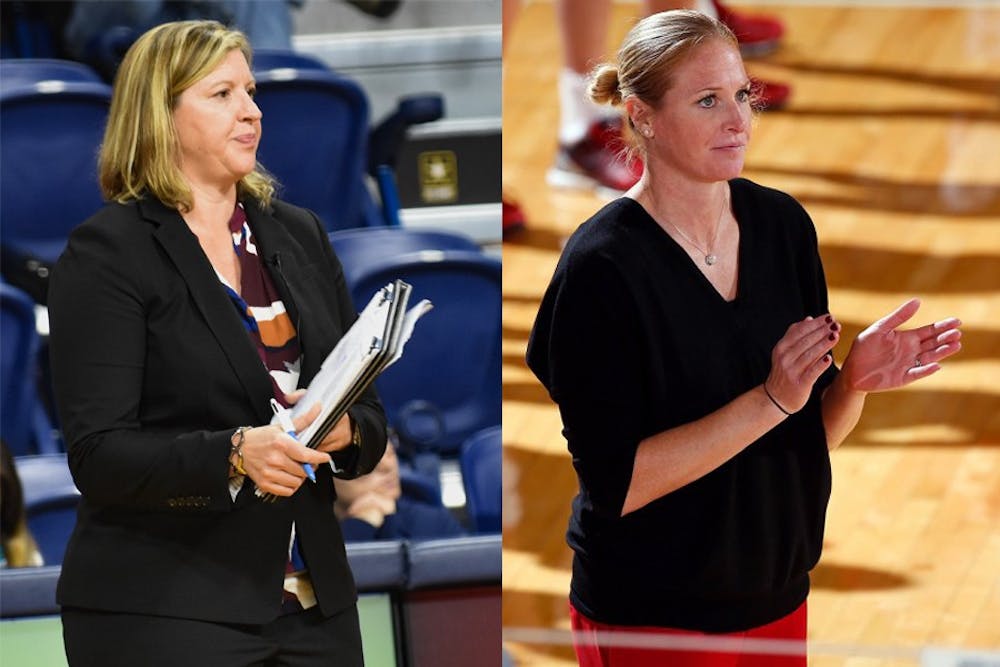
In the two seasons before new coach Iain Braddak was hired, Penn volleyball was coached by both Kerry Carr and Katie Schumacher-Cawley. //Photo from Penn Athletics
Adapting to a coaching change can be one of the hardest tasks for college athletes. The relationship a player built with their old coach might be completely different from the relationship they build with their new one. The athlete needs to adjust to everything from coaching style to how they fit the coach’s vision for the team.
As challenging as readjusting to a new coach can be, try doing it three times — which is the unique situation facing Penn volleyball upperclassmen this season as they play under their third different head coach in as many years.
The team has not viewed all the changes negatively, though. In fact, it’s quite the opposite.
“It’s a unique opportunity, because each individual player has had to become much more adaptable, [because they’ve] been put in an environment where they have to learn quickly to fit whatever system the new coach is bringing,” junior captain Caroline Furrer said. “For every girl on this team, we’ve become so much stronger because of the three coaches in three years.”
Coaching turnover in Ivy League volleyball is more common than one might think. Columbia and Brown are also breaking in new head coaches this season. Dartmouth and Cornell’s head coaches are in their third and fourth season, respectively. The only programs in the Ancient Eight that have stable coaching situations are Harvard (26th season) and the two best teams of the last decade, Yale and Princeton (16th and eighth season, respectively).
For years, Penn had been in a similar position to the aforementioned trio with Kerry Carr, who coached at Penn for 19 seasons from 1998 to 2016. The team then looked ready to take off under last year’s coach, Katie Schumacher-Cawley, before she left after a season to take an assistant job with her alma matter, Penn State.
In all, the juniors and seniors have taken the floor under all three coaches, Carr, Schumacher-Cawley and first year coach, Iain Braddak.
Braddak has tried to instill a strong sense of culture into his team, which can often be lost amidst a coaching transition. That culture and identity is built on what Braddak has called the team’s greatest strength: grit.
“One thing we’re focusing on this year is redefining our culture because of all the changes that we’ve had,” Furrer explained. “[We’re] really trying to leave behind something that will resonate for the girls that are going to take this program on once we’re gone.”
While developing a team’s culture is one thing, making it last is another. That task lies with the younger players on the team who, like the team's veterans, have been subject to the coaching changes, albeit in a different way.
The sophomores and freshmen were recruited by one coach but came in their rookie years to play for another. For some of those younger players, like freshmen defensive-specialist Carmina Raquel, who was recruited by Schumacher-Cawley, it was hard to hear the team was going through another transition because of the effect it might have on the rest of the squad.
“It was tough to hear [Schumacher-Cawley was leaving] because I respected Katie a lot and valued her coaching ideas,” Raquel said. “But I trusted the University of Pennsylvania’s athletic board and athletic directors to find a good fit [to replace her].
"I knew the girls were strong, and I knew that they had each other.”
Such is the feeling shared among the team after going through all of the changes they’ve experienced. At the end of the day, one thing has remained constant throughout this period of change: the team itself and their love for the game.
“[Having three coaches has] fostered an environment of really loving the game because that’s what’s kept us here, is each other and our love of the sport,” Furrer said.
"Regardless of who our coach is, the three years of change has forced us to love the game even more.”
The Daily Pennsylvanian is an independent, student-run newspaper. Please consider making a donation to support the coverage that shapes the University. Your generosity ensures a future of strong journalism at Penn.
Donate







